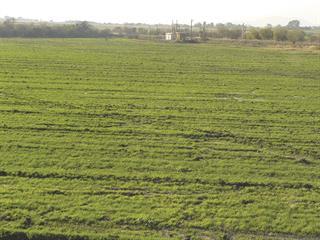
In June last year, Bone Mokomela, a 48-year-old father of three, planted his first wheat crop on a 28ha farm he leases in Kareepoort, about 10km west of Brits in the North West. He took the first substantial step toward living his dream.
But the crop only yielded about 8t on the 14ha he planted. “I made a mistake by not doing the proper research and getting the right training,” says Bone.
He grew up in Segwaelane, about 20km from where he currently farms. He spent six years in the tyre industry, then went to the then University of Bophuthatswana. With a bachelors degree in agriculture, specialising in livestock, he landed a job as an extension officer with the North West agriculture department, and was placed at the Moretele office near Hammanskraal.
In 2006, he took a transfer back to Brits. “I wanted to be closer to home,” he explains. The move introduced him to commercial crop farming. “Changing from livestock to crops wasn’t too hard,” he says. “All it takes is being passionate about what you do.”
Land restitution beneficiary
Bone was inspired when he saw how many black South Africans were going into farming. At the time, the Segwaelane community had just won a restitution claim on the Kareepoort area, and received more than 2 000ha.
The farms were administered by the Gotsube Le Thotwe Community Property Association (GLTCPA). Bone approached the association to lease land. “I was granted a 10-year lease with an option to renew after the lease ended,” he explains.
The lease included the 28ha farm with infrastructure, but no machinery. All the GLTCPA farms are still registered with the Hartbeespoort Irrigation Board. Bone pays a monthly flat rate of R500 for the lease period.
“The farms aren’t used as residential areas, as you find in some communities. They are strictly for farming,” says Bone. However, only village residents are allowed to lease the farms and some stand vacant. They’re invaded by weeds and the buildings aren’t maintained, which will make things even tougher for those who will eventually occupy them.
For Bone the best way to avoid this is if the farmers currently leasing land could expand their businesses so they can lease more land, and if greater attention is paid to involving the youth in agriculture.
Currently, there are only about 11 emerging farmers working the land. Each farm is allocated about 12ha of irrigation water, at a cost R900 a month. The water supplied must be paid for, whether used or not. So the vacant farms will accumulate a water debt if they remain unoccupied for much longer.
Facing challenges head on
Bone says he’s learnt the importance of acquiring the right skills, but that not owning the right equipment threatens his success. Undeterred even by last season’s low yield, he was going to plant soya beans after harvesting his first wheat crop last June. However, without equipment, he ran out of time.
“I have to rent equipment from commercial farmers,” he explains. “But because we all plant the same commodities, timing is most important.”
Even this setback didn’t get him down. Since planting soya beans wasn’t feasible, Bone planted sunflower on 14ha instead. And the 2t/ha yield was better than he expected.
Bone markets his grain through Obaro, part of the MGK group. He intends planting all 28ha under soya beans next season. “Compared to wheat and sunflowers, soya beans pay much better,” he says.
In his area, birds are a problem. “I lost a lot of my sunflower to birds, but they’re not so keen on soya beans.”
Adding to Bone’s problems is the flood irrigation system he uses. He says he would do better if he could afford another irrigation system like a centre pivot. “Especially on clay soils like mine, flood irrigation can get messy.” This also increases his fertiliser costs as a lot is flushed away.
Challenges for emerging farmers
As ever, finance remains a challenge for many emerging farmers. Help from the state is minimal – if it ever reaches them, says Bone.
“When it comes to land restitution, government must make sure land is used for farming. They must also make sure the right agricultural activities are practised on the right land,” he stresses. “It doesn’t help to give people land that is good for crops if they use it for livestock.”
Bone feels another reason why emerging farmers fail is in the way they treat their farming operations. “Farming is a business and should be treated as such,” he says.
His farm is a registered business with its own bank account. “This way I keep records of costs and profits.”
Building up good relationships is also important. “You must have good relationships with commercial farmers in your area. That’s partly how I’ve managed to survive,” Bone concludes.Contact Bone Mokomele on 073 045 5794. |fw












